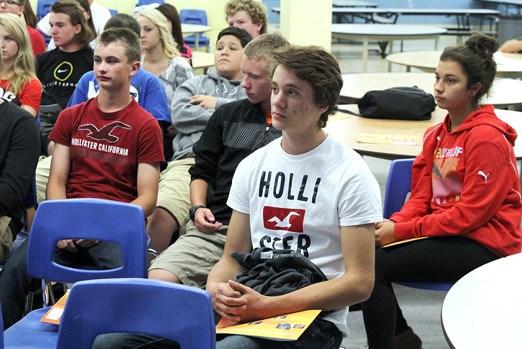Teens don’t often trust adults on the best of days.
When thoughts of suicide are swirling around their heads, the last person they’re likely to talk to is a parent. Their peers are a different story altogether.
“If you look just at the amount of time that kids spend with each other, kids are more likely to confide in each other. Kids are more likely to see things that maybe make them feel that something is not as it should be,” said Ryan McDonnell, a teacher at Sir Winston Churchill Collegiate and Vocational Institute, who on Monday helped anti-suicide activist Scott Chisholm stage Safe Talk, a program designed to teach people to spot the signs of suicide before it happens.
“Peer intervention is a very valuable tool, as well as staff intervention, as staff will have the supports they need to have to be safe.”
Colin Smyk was among the students who took part in Monday’s seminar and said it’s an issue that needs to come out in the open.
The 17-year-old said he wants to be part of the peer-support group to help ensure students in distress get the help they need before it’s too late.
“I’m taking part in this to learn how to help because I’ve never been directly affected by everything like this, but it shows in the school around you, the environment around you when it does happen,” Smyk said.
“I’m just hoping that if I were to go through this, learn all the tools that are needed, that I could help if anything ever happened.”
The internationally-recognized program familiarizes participants with the signs of suicide, whether it’s a sudden disregard for personal appearance, sudden abuse of drugs or alcohol, or words that suggest the end might be near.
“They may say things like, ‘I just wish this would end,’ and then they may do things like self-harm, which are all signs that someone might be thinking about suicide.”
At the high school level, suicide is always a danger, MacDonnell went on to say, but it can be prevented.
“The intention is to teach kids what the signs are to look out for and then to get that person the help and support that they need. So by no means will these students or staff be counselors at the end. We’re just hoping to give them some tools.”
Chisholm, whose father took his own life when Chisholm was just 17, is the founder of the Collateral Damage Project, and said teaching students and teachers to recognize the signs of suicide may not save all lives, but even one is a start.
It’s come a long way since he was a teen, the Thunder Bay firefighter said.
“My teachers had no tools. My peers had no tools. Nobody talked about it. Even as a survivor of suicide, per se, I had nobody to go to. This workshop breaks down the barriers and starts dealing with the stigma that keeps us back from helping other people,” said Chisholm, who has also shared the course with city council in the past.
Talking about suicide doesn’t increase the likelihood it will happen, he added and direct and honest talk is the best way to prevent it.
“It’s the first step, but then we have to look at how we put tools in place to break down the myths,” he said.
“Sometimes people are afraid to do something about it, to help or to care, because it might make it worse. It’s untrue. It’s a myth. Tools like today, Safe Talk, will make people think otherwise.”
